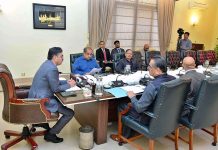
ISLAMABAD, Jan 18 (APP): Minister for Information and Broadcasting Chaudhry Fawad Hussain Tuesday said the opposition was only focused on hatching conspiracies against the government despite latter’s constant efforts to engage them on major system reforms.
“We want to engage the opposition on electoral and judicial reforms, and the process for appointment of NAB chairman, but the reforms are not the priority of opposition leaders,” the minister said while talking to media persons after the Federal Cabinet meeting chaired by Prime Minister Imran Khan.
Fawad, who was flanked by Minister for Energy Hammad Azhar, said he, himself, the National Assembly speaker and the prime minister had invited the opposition on negotiating those three issues, but, unfortunately, their leaders only wanted to topple the government.
From the very first day, he said, they (opposition leaders) desired that they would succeed in removing the current government after six months, and they were still yearning for that. They had already passed four years with such illusions, and the next five to six years seemed to be not any different for them.
As regards the criticism of Pakistan Muslim League-Nawaz (PML-N) Vice President Maryam Nawaz on the government, Fawad said even the children did not take her remarks serious.
Responding to a query about the boom in media ad revenue, he said the journalists should rather ask from their elected representatives as to why they were still facing exploitation.
He said he had worked out a law to protect journalists’ rights, regretting a systematic campaign launched against him on the initiative.
“It is difficult to fight the mafias,” he said, urging the media houses to share their financial details if they had any objection on his statement about increase in the media spend.
He said that cabinet was given a detailed briefing on the Covid-19 situation in the country.
It was informed that daily cases had reached over 5000 with rise in hospital admissions, including 20 per cent increase in ICU cases.
The minister said vaccination was vital as those, who had gotten two jabs, were more safe against the Omicron variant than the unvaccinated.
Unfortunately, he said, the Sindh province was lagging behind in the vaccination process, as its capital Karachi was the most affected city in terms of the cases of new variant.
Schoolgoing children were the major victims, he added. Fawad said the government had spent $2 billion on the import of vaccine. Major portion of the current account deficit comprised the imports of medicines, including vaccines for the coronavirus.
The minister said the cabinet discussed establishment of special technology zones as new technology was vital for the country’s development.
Setting up such zones would create job opportunities, besides increase the IT exports. He said the cabinet also discussed the issue of effective legislation and the effective role of Parliament in the nation building process. The bill regarding State Bank of Pakistan’s autonomy would be tabled in the Senate soon, which would hopefully adopt it, he added.
The cabinet asked the National Assembly and Senate secretariats to avoid nominating members having conflicts of interest for various parliamentary committees.
It was observed that contractors and builders became members of the committees on communications, and those owning information technology firms joined the committees concerning the information technology, he added.
He said the Ministry of Industries and Production briefed the meeting about the Urea production and its availability in the country. There was record production of the Urea in Pakistan during the current year, but on the other hand wheat was cultivated on 0.5 million acres of land while its price in the international market was 6 times high.
Despite some pressure, Urea was available in most parts of the country as bumper wheat crop was expected, he added.
The minister said the cabinet also discussed in detail the power transmission system, and Minister for Energy Hammad Azhar informed the cabinet about the ongoing steps to control line losses. It was told that it would be the first year in which circular debt would start coming down substantively.
He said the SBP Amendment Bill was essential for economic recovery and structural reforms.
During discussion on the protection of green covers of big cities, it was informed that before 2018, a marked reduction in the number of green areas and trees was noticed.
The measures taken by the government after 2018 had not only increased the number of trees in Islamabad but also reclaimed its green cover, he said, adding steps were also taken to retrieve state land from the mafia.
The prime minister directed that the master plan of all major cities should be finalized as soon as possible, with focus to increase the number of green areas and trees in urban areas.
The minister said a committee had been formed for deciding on extension of protocols against smuggling of migrants by land, sea and air.
The cabinet gave extension to the United Nations Educational, Scientific and Cultural Organization (UNESCO) 2005 Convention on protecting and promoting cultural diversity.
He said the approval for Pakistan Railways Freight Transportation Company’s board of directors was also given by the forum. It included Abdar Khan, Naveed Arshad, Tayyba Rashid, Farrukh Shaukat Ansari and Prof Dr Fakhra Khan.
Likewise, the cbainet okayed reconstitution of the board of directors of Railway Construction Pakistan Limited, including Azam Adil Sheikh, Shahid Aziz, Fareedu Din Ahmed and others.
He said the annual report of National Electric Power Regulatory Authority (NEPRA) was also presented to the cabinet. It was the first time in the last 24 years that the report was presented on time.